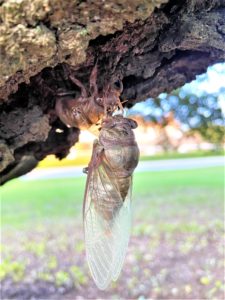
By Mary Reid Barrow
You wonder what this cicada, hanging from the branch of a live oak tree on the Feeder Road, was thinking, as it dried out its wings.
So much had happened to it in a short period of time
Having lived underground for about two years, the cicada, clad in its ugly brown nymph shell, had just scrabbled out of the ground and crawled up the tree.
Then its coat split open and it emerged as this huge summer insect with shimmering wings. After two long years, it was an adult cicada at last!
And that’s when Terri Gorman, LRNow’s Pearl Home coordinator, happened to see it recently and took its photo. The sun was shining on the green leaves of the tree and the noise of Atlantic Avenue traffic was all around.
What a different world this is, the cicada must have thought.
If it were a male, the cicada would soon be calling out its buzzy song to female cicadas everywhere. The cicada’s adult life span on high is only about six weeks long, but it is an active, noisy six weeks. It sure beats a couple of years, in the dark underground, dining on tree roots.
Right now Terri’s cicada, if a male, may be singing its buzzing song, but definitely, it is flying free and procreating. If a female, she soon will create little holes in tree branches where she will lay her eggs. When the eggs hatch, the nymphs will fall down and burrow in the ground from whence their parents came. And there they will live for two long years.
Our local cicadas are called dog day cicadas because they liven up our sultry summer months A summer evening without the cicada’s buzzy song would be a dull evening for sure here in Southeastern Virginia.
But in the northern and central part of the state, residents would be happy to do without the noisy background songs of another species of cicada, called periodical cicadas. These nymphs emerge from the ground, en masse as one brood, in spring in various locations. They sing their heads off, creating deafening, ear-splitting sounds that go on for a short, but seeming eternity.
We don’t get the periodical cicadas here in Hampton Roads because it is thought that our soil is too sandy for 17 years of underground living.
We just get dog day cicadas, like our friend on the live oak branch, that hum their songs in summer and are reminiscent of evenings on grandma’s porch long ago.
Do you have a favorite tree or plant with a story to tell? What relationships have you observed between plants and critters? Who eats whom? Who has babies where? Send an email to maryreid@lrnow.org√